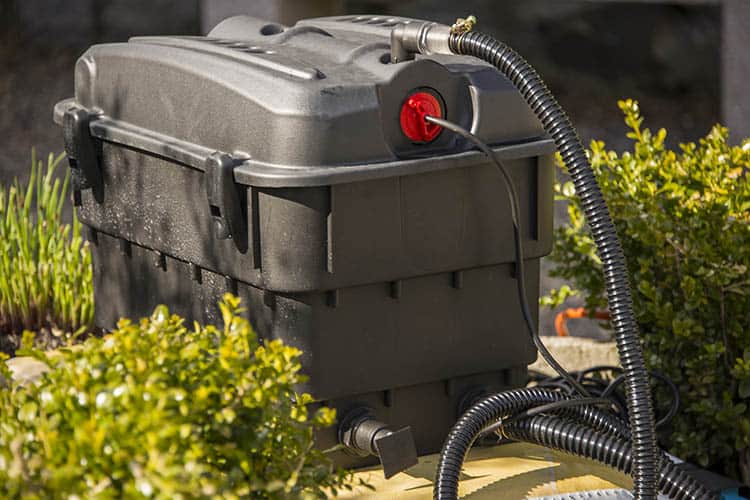To maintain a perfect ecosystem of your pond, and ensure your fish are healthy and not stressed out, filtration is one of the most important things to keep in check. However, is it possible to over filter it?
You can over filter your pond, but the good thing is that it will not really cause a health problem to your fish. A very clear water environment with minimal toxins is not a bad thing for fish. That said, there may be other down slides of over filtering a pond, e.g., energy wastage.
In this article, we’ll get into a detailed discussion of the basics of pond filtration, where we’ll explain the types of filtration. We’ll also talk about the signs that show you are over filtering your pond and mention its effects. Let’s begin.
Basics of Pond Filtration

Filtration is one of the essential practices when rearing fish in a pond. If you want to have clean and clear waters, then installing a filtration system will do the trick. It also ensures you have a healthy ecosystem.
There are three types of processes that take place in a filter to purify the pond water.
Mechanical Filtration
This process is important for getting rid of suspended particles in the water before they settle at the bottom. It’s the most basic form of filtration. Another name for a mechanical filter is a pond skimmer.
A great example of a pond skimmer is the TetraPond in-Pond Skimmer (link to Amazon). It’s easy to install and clean, and so will make your work more manageable.
To enable mechanical filtration, the filter box is fitted with filter media, e.g., foam or filter mattings, which are either positioned vertically or horizontally in the box. These media capture floating debris and particles as the water flows through it.
Every once in a while, the media should be removed and cleaned in order to get rid of the accumulated dirt over time. This also serves to prevent clogging.
Here’s a video of a step-by-step guide on how to clean your filters:
Chemical Filtration
As the name suggests, this is filtration using chemicals. Unwanted or unpleasant colors, odors, and other organic wastes like ammonia are removed using certain chemicals that are infused in the filter pads.
One of the most common methods is using activated charcoal or carbon. These chemicals absorb the bad smells and colors, leaving behind a fresh and clean aqua environment.
Unlike in mechanical filtration, where filters are cleaned to get rid of the accumulated dirt over time, the chemical filters are usually replaced with new ones.
You can get the EA Premium Carbon Infused Filter Pad (link to Amazon) to be replacing your filter box. This filter pad is made using premium material, which traps unwanted particulates and prevents premature clogging. It can be used for a relatively long time before requiring replacement.
Biological Filtration
Biological filtration is the most important filtration component in a pond. It works using beneficial bacteria that break down toxic waste products into less harmful substances.
The waste products are mostly ammonia from fish excretion, dead plants, and algae. Useful bacteria break down the ammonia into nitrite and later into nitrate, taken up either by the aquatic plants or the algae.
Biological filter media are best positioned right after the mechanical filter media so that the larger dirt particles are first captured in the mechanical media. And since bacteria grow well in an oxygenated environment and with a surface to attach to, the biological media offers an ideal surface for bacterial growth. Other surfaces like rocks, pumps, and plants also serve as a great medium for useful bacteria to grow.
Signs and Effects of Over Filtering a Pond
As we mentioned at the start of this article, over filtration does not adversely affect the health of fish in the pond. Over filtering results in very clean and clear waters, and these are not detrimental conditions to flora and fauna living inside that water environment.
That said, you may still need to assess whether you are over filtering your pond because there are other aspects of pond maintenance that may be affected.
Filtration should just be adequate, and the ecosystem kept at a certain balance. Maintaining a stable environment is what is most important for the health of the fish.
So, here are signs that point to over filtration of your pond.
Frequent Blockage of Filter Media
Once the filter media is filled with dirt particles, it should be rinsed out and cleaned, then returned to the filter box. This is done whenever you notice the flow of water through the filter box has slowed down significantly.
If this blockage occurs too frequently, and the pond appears unnaturally clear, that’s a sign you are over filtering your pond. Your filter media are too fine, hence getting blocked by the tiniest of dirt particles, or you may have packed too many filter media in the box.
Find out what’s causing the constant blockage and correct the problem. This will mean removing some media or replacing the fine ones with more coarse mattings.
Effects
So why is frequent blockage of filter media an issue?
As we’ve mentioned, your main concern, aside from having a healthy ecosystem, is maintaining a stable environment. With this filtration level that requires constant washing out of your media, it is unlikely you’ll be able to sustain such an environment. That means you may eventually have an unstable ecosystem.
The solution is to evaluate and find out the ideal level of filtration by assessing the water clarity. Once you get to a desirable level, any more filtration will mean more work for you, which will be unnecessary.
Excessive Water Flow
While it is common practice to install a pump together with your filtration system in a pond, the rate of circulating the pond water should be set at an ideal level. If the entire volume of water in the pond is circulated once every 1 or 2 hours, that is ideal and very sustainable.
Any more water circulation, say multiple turnovers within just one hour, is a recipe for trouble. This will mean there’s excessive water flow in the pond as water is pumped out then released back into the pond. You may even notice this increased water flow by just looking at the pond.
Effects
Too much pumping means more electricity is being used (unnecessarily) on the filtration system. This will only serve to increase the cost of rearing your fish without adding any benefit to the stock.
What is more, the excessive water flow may even upset the fish too much and affect their survival. Therefore, you may run the risk of losing some of your stock due to stress.
The solution to this is pretty simple. Maintain a stable and reasonable circulation of your pond water. Ideally, the whole volume of your pond circulating through your filter should be once every 1 to 2 hours.
The Verdict
As it stands, it’s clear that filtration is an absolute necessity for a healthy pond environment with fish. Even so, it’s possible to over filter the water. Most of the time, this occurs unknowingly and can only be discovered if a very targeted assessment of the system is done.
When making this evaluation, the health of the fish may not be affected, so the parameters to look at are signs of frequent filter media blockage, and excessive water flows in the pond.
The overall effect of over filtering a pond is a lack of capacity to sustain that level of filtration, especially because of the excessive energy, time, and electricity it will need. Therefore, maintaining a stable ecosystem will be a challenge, and this is what will affect the fish in the long run. So, in conclusion, it’s advisable not to over filter a pond.

